If there is any other thing that Maine Coons are known for besides their size, it is their large appetite compared to other house cat breeds. From my personal experience of breeding Maine Coons for about a decade, I can tell you that feeding a Maine Coon is not as simple as filling a bowl with food and walking away.
In this guide, I will explain everything you need to know about feeding your Maine Coon properly. By the end of this article, you will learn exactly what to feed your Maine Coon even if this is your first time, the Maine Coon feeding chart, how much your Maine Coon should eat, the types of food that keep your Maine Coon healthiest, and how to adjust the meal size as your cat grows.
You might like: Maine Coon Kitten Care Guide
Maine Coon Feeding Chart by Age and Weight
How much a Maine Coon eats depends mostly on age, activity level, and body size. Because they grow more slowly and keep developing well into their third or fourth year, their calorie needs change gradually, not suddenly.
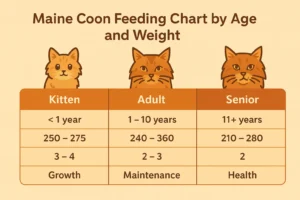
Below is a simple but very effective feeding guide I always recommend new adopters to use as a baseline to get started with their Kitten. Always remember that no two cats are identical, so I recommend that you adjust to fit cat’s weight, energy level, and whether you are feeding dry, wet, or mixed meals (note this is all from lessons I have learned from several years of being a breeder).
You might like: How to Socialize a Maine Coon Kitten
Maine Coon Kitten (8 weeks – 12 months)
- Age: 2–3 months → 4–5 small meals per day
- Age: 4–6 months → 3–4 meals per day
- Age: 7–12 months → 3 meals per day
- Daily Amount: Around 200–350 calories, depending on weight and activity
- Diet Focus: High-protein kitten formula (minimum 35–40% protein)
When your cat gets to this stage, steady growth matters more than rapid growth, so a slow, protein-rich diet supports strong bones and a healthy coat without risking joint problems later.
Adult Maine Coon (1–6 years)
- Meals per Day: 2
- Daily Amount: 350–500 calories for a 15–20 lb adult cat
- Diet Focus: Balanced high-protein cat food with moderate fat (around 30–35% protein, 15–20% fat)
Adult Maine Coons benefit from a mix of dry kibble and wet food. The dry helps with dental health, while wet food adds hydration and flavor variety.
Senior Maine Coon (7+ years)
- Meals per Day: 2
- Daily Amount: 300–400 calories, adjusted for slower metabolism
- Diet Focus: Senior cat formula with joint-supporting nutrients like glucosamine and omega-3 fatty acids
Quick Feeding Reference (Summary):
| Age Group | Meals/Day | Daily Calories | Focus |
|---|---|---|---|
| Kitten | 3–5 | 200–350 | High protein for growth |
| Adult | 2 | 350–500 | Balance energy & weight |
| Senior | 2 | 300–400 | Support joints & digestion |
You might like: Maine Coon Grooming Guide Brushing, & Coat Care Tips
Best Types of Food for Maine Coons: Dry, Wet, or Homemade?
If you’re wondering which type of food will keep your Maine Coon thriving (rather than just surviving), you’re not alone. There’s a lot of advice out there, raw vs kibble, wet vs dry, homemade vs store-bought, and it’s easy to get overwhelmed.
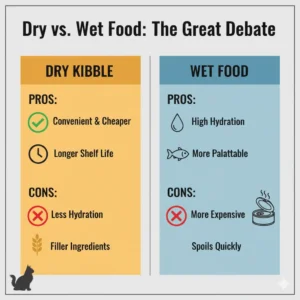
The truth is that there is no one perfect diet that fits every Maine Coon, it comes down to your cat’s individual needs + your lifestyle. Here’s how I break it down, based on what I’ve seen work in real homes with Maine Coons.
Dry Food (Kibble) – Convenient, Consistent, but Choose Wisely
Dry food is the go-to for many owners. It’s easy, doesn’t spoil fast, and can be great for big cats like Maine Coons. But not all kibble is created equal.
- Pro: Free-feeding is easier, as many kibbles are formulated for adult cats with balanced nutrition.
- Con: Quality varies widely some contain fillers, low-grade proteins, or excessive carbohydrates (which can lead to weight gain in a large breed).
- What to have an eye out for: Always look to see that “animal protein” is listed as the first ingredient, and another thing to do is to reduce fillers like corn, wheat, or soy.
- My experience: With one of our Maine Coons, switching from a “budget” dry food to a high-quality brand reduced vomiting episodes and improved coat sheen.
Quick tip: Set up a container of premium dry food, but pair it with wet or other food types sometimes for hydration.
Wet Food – Hydration + Palatability in One
When your big fuzzy baby needs a little extra hydration or you want to mix things up, wet food is your friend.
- Pro: Contains more moisture, which helps cats who don’t drink enough water. Good for kidney and urinary health.
- Con: More expensive, can spoil fast if left out too long, and sometimes less calorie-dense (so you need more quantity for a large cat).
- My experience: I offered one Maine Coon wet food for breakfast and dry food at night. It boosted overall food intake during his growth spurt and improved his fur and energy levels.
Please note that If you go wet plus dry, measure carefully, large breed means large appetite, so avoid overfeeding.
Raw / Homemade Diets – Premium Option, More Work
Feeding raw or homemade diets can be excellent if done properly, but they demand more time, research, and discipline.
- Pro: You know exactly what’s going into the bowl. It can mimic the natural diet of a hunter cat like the Maine Coon.
- Con: Meal prep is time-consuming, freezer space is needed, the hygiene risk is higher, and nutrient balance must be managed carefully (especially for growth and adult phases).
- My experience: One owner in a breeder forum said, “Raw worked great until we got busy, and meals became inconsistent. Then his weight drifted.”
- If you choose this route, consult a vet or a certified pet nutritionist and include taurine, bone/calcium ratios, and vet-recommended supplements.
Quick tip: Combine dry/wet with an occasional raw treat or meal, rather than going full raw, unless you’re dedicated and experienced.
Which Type Should You Choose?
Here are a few “anchor questions” to ask yourself:
- How much time do I have for feeding prep?
- How active is my Maine Coon (indoor vs outdoor)?
- Is my cat a kitten, adult or senior?
- Do I see signs of low energy, poor coat, vomiting or digestive issues?
- Can I measure and monitor his weight regularly?
If you answered “I’m busy” or “I prefer convenience,” go with a high-quality dry + optional wet combo.
If you answered “I want to do the best I can and I have time/resources,” then consider a raw or homemade diet (with vet input).
Regardless of choice: Monitor your cat’s coat, digestion, and weight, not just how much they eat.
How Much Should a Maine Coon Eat per Day?
One of the most common questions Maine Coon owners ask, usually right after “why is my cat so big?” is how much they should actually be feeding them. It’s a fair question because Maine Coons are deceptive. Their fluffy coats make them look heavier than they are, and their appetite can make them seem like they need twice as much food as a normal cat.
The truth is, Maine Coons don’t need huge portions they just need the right balance of calories, protein, and routine.
For Maine Coon Kittens
Kittens burn through energy like crazy, especially between 2 and 12 months when growth is at its peak. They also need more frequent meals to maintain energy and healthy weight gain. Creating a consistent feeding schedule also helps your kitten develop predictable habits, which supports establishing routines during socialization.
- Age 2–6 months: 4 small meals per day
- Age 6–12 months: 3 meals per day
- Daily calories: Around 200–350 calories total
- Rule of thumb: ⅓ to ½ cup of high-protein dry food (or the wet-food equivalent) split into several meals.
Tip: Don’t worry if your kitten seems to graze. Maine Coons are slow, steady growers. Just avoid constant free-feeding; it can lead to overeating later.
For Adult Maine Coons
Once your Maine Coon reaches adulthood (around 12–18 months), you can move to two main meals a day.
- Average weight: 15–20 lbs
- Calories needed: 350–500 calories/day, depending on activity
- Dry food portion: ½ to ¾ cup of high-protein kibble per day
- Wet food portion: 6–9 oz total per day if feeding only wet
If your cat is mostly indoors, stick closer to the lower end, but outdoor or highly active cats can handle more.
For Senior Maine Coons
After age 7, Maine Coons start to slow down. Their metabolism dips, and they may develop joint stiffness or less muscle tone.
- Calories needed: 300–400 calories/day
- Focus: High-quality protein (to maintain muscle) with joint supplements like omega-3s and glucosamine.
- Meals: 2 small meals per day, with wet food included to help with hydration.
Please be mindful that Senior cats do best on consistent mealtimes, and make sure as often as possible to void sudden diet changes, as it can upset their digestion.
Quick Feeding Snapshot
| Life Stage | Meals/Day | Daily Calories | Typical Portion |
|---|---|---|---|
| Kitten | 3–5 | 200–350 | ⅓–½ cup dry or wet equivalent |
| Adult | 2 | 350–500 | ½–¾ cup dry or 6–9 oz wet |
| Senior | 2 | 300–400 | Smaller portions + supplements |
Feeding amounts will always vary a bit depending on your Maine Coon cat size and activity. Some Maine Coons are long, lean athletes, while others are big, laid-back cuddle machines. What matters most is consistency and observation.
If your cat starts skipping meals, losing weight, or begging constantly despite normal feeding, that’s a cue to check with your vet or adjust portions slightly.
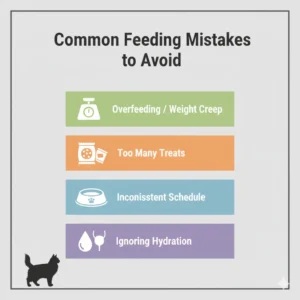
Feeding a Maine Coon isn’t rocket science, but it’s surprisingly easy to get a few things wrong. These gentle giants can charm you into overfeeding them with those big, soulful eyes. Don’t fall for it (they’re professionals). Here are some of the most common Maine Coon feeding slip-ups that could cause long-term trouble for your cat.
1. Overfeeding and Weight Creep
Maine Coons are large, but not fat large, this is one fact that many owners mistake their natural fluff and bone structure for a green light to give extra portions. So, a few extra calories a day might not look like much to you, but when accumulated over time, it can lead to weight gain that strains their joints and shortens their lifespan.
2. Too Many Treats or “Human Snacks”
I understand sharing a little chicken from your plate feels harmless, but table scraps and sugary treats can easily upset your Maine Coon’s digestive balance. However, I have, from many years of experience, seen one too many people who, out of ignorance, have made mistakes of sharing human foods (like onions, garlic, and chocolate) which end up being toxic to cats, and they quickly end up at the vets.
3. Ignoring Hydration
Even though Maine Coons are part of the feline royalty, they often don’t drink enough water. What most people don’t even know is that dry kibble diets can make this worse, leading to urinary issues over time.
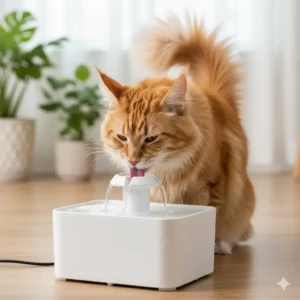
So my simple but very effective quick hack is to mix a spoonful of wet food into their kibble, or get a cat fountain because Maine Coons love running water.
4. Inconsistent Feeding Schedule
Cats thrive on routine, and Maine Coons are no exception, so skipping meals or feeding at random times can trigger stress, overeating, or picky behavior. My advice to adopters is to make sure they feed their cat at the same time every day, I personally prefer morning and evening, and keep their portions consistent.
5. Not Adjusting for Activity and Age
Your Maine Coon goes through 3 distinct stages from a growing kitten, playful young adult, to a laid-back senior cat, the calorie intake needed changes as well. If you keep feeding the same portion size as your Maine Coon slows down with age, the pounds will sneak on fast.
To make sure you are feeding your cat correctly, revisit your feeding chart every few months, especially after your cat is neutered or becomes less active.
Supplements for a Healthy Maine Coon Diet
If you are already feeding your Maine Coon a high-quality, balanced diet, that would get 90% of the job done. But sometimes, a few smartly chosen supplements can give their diet an extra edge, especially for joint health, skin, and that signature silky coat.
That said, not every supplement is necessary or even safe, but not to worry, because I will walk you through the good, the useful, and the please-don’t-try-this-at-home category.
1. Omega-3 Fatty Acids (Fish Oil)
Omega-3 fatty acids are important to Maine Coons as they help to keep their thick fur luscious, their coat glossy, tangle-free. These healthy fats also support joint health and reduce inflammation.
2. Taurine
Taurine is not optional, it is essential, as it supports heart function, vision, and digestion in cats. Most quality cat foods already include the right amount, but if you’re feeding a homemade or raw diet, taurine supplementation is a must, this can tell you from years of experience as a maine coon breeder.
If you are unsure, here is a quick test to know your cat’s Taurine levels. You can quickly check if your cat’s eyes look dull or if they seem unusually lethargic, then talk to your vet about taurine levels.
3. Probiotics
A Maine Coon’s stomach can be surprisingly sensitive, especially during food transitions, trust me, I have experienced this several times with rescued Maine cooon cats. I have also found that Probiotics help maintain healthy gut flora and reduce bloating or loose stools during this process.
4. Glucosamine & Chondroitin
Big bones and heavy frames come with a catch. Maine Coons, due to their size, are prone to joint stiffness and hip issues as they age, but vets would normally recommend Glucosamine and chondroitin to help keep their joints moving smoothly.
5. Use Multivitamins with Caution
Multivitamins are good for your cat, but please make sure to stick to a recommended dosage, so as a rule of thumb, know that more is not always better. So, if your cat eats balanced commercial food, multivitamins can overload them on certain nutrients (supplements should fill a specific gap, not pile on unnecessary extras).
With that being said, my golden rule and advice is to always make sure you talk to your vet before adding anything new. Cats metabolize nutrients differently from humans, and a “safe dose” for you might be toxic for them.
In a nutshell, supplements can do wonders when used intentionally, but focusing on quality, not quantity, and never skipping your vet’s opinion before introducing anything new. A well-fed Maine Coon doesn’t need a medicine cabinet full of powders and pills, just the right food, and a little thoughtful support when needed.
Feeding Tips for Maine Coon Owners
Feeding a Maine Coon isn’t just about what’s in the bowl, it’s also about how you feed them. These gentle giants have unique habits and preferences that can make mealtime either a joy or a minor circus. Here’s how to keep things calm, clean, and cat-approved.
1. Use Elevated Bowls
Maine Coons are big. Their long legs and sturdy build mean they’re more comfortable eating from slightly raised bowls. Elevating their dish helps reduce strain on their neck and improves digestion, especially as they age. A 4–6 inch elevation works best for most adult Coons. You’ll be surprised how much cleaner their mealtime gets, too.
2. Slow Down the Fast Eaters
If your Maine Coon eats like it’s a race, you’re not alone, as just like kids, sometimes you have to condition and teach your coon to eat. Fast eating can lead to bloating or vomiting (also known as “scarf and barf”). You can help adjust this behavior by using a slow-feeder bowl or puzzle feeder. It turns mealtime into a gentle challenge, stimulating their mind while slowing their pace.
3. Keep Fresh Water Always Available
With Maine Coons hydration is very important, even if your Coon eats mostly wet food, they still need access to clean water all day. Their thick coats and size make them prone to overheating, especially in warm weather. Sometimes, a simple solution like a cat water fountain can encourage them to drink more, as Maine Coons tend to love moving water.
4. Create a Calm Feeding Space
These cats may be social butterflies, but they still prefer a peaceful dining environment, so loud TVs, kids running by, or dogs hovering can make them nervous eaters. If your house fits this description, then I would suggest you set up a consistent feeding spot, quiet, cozy, and separate from the litter box. Routine helps them feel secure.
5. Stick to a Schedule
From years of experience as a breeder, I can tell you that consistency matters more than you’d think. I always advise people to make sure they feed their Maine Coon at the same times daily to keep their metabolism balanced and avoid begging behavior. So, as a rule of thumb, I advise feeding twice a day, once in the morning, once in the evening, which works for most adult Coons, but kittens may need more frequent meals (3–4 times daily).
6. Don’t Forget Treat Control
It’s easy to spoil a Maine Coon those big, pleading eyes are dangerous. But treats should never make up more than 10% of their daily calories. Go for natural options like freeze-dried meat or vet-approved snacks.
FAQs
How many times a day should I feed my Maine Coon?
For adult Maine Coons, two meals a day, morning and evening, is ideal. Kittens, on the other hand, need more frequent feedings (about 3–4 times daily) since they’re growing fast and burn through calories quickly.
Do Maine Coons eat more than normal cats?
Yes, absolutely. Maine Coons are big cats, often weighing twice as much as the average domestic shorthair. That means they naturally need more calories and protein to sustain their muscle mass and long growth cycle.
But “more” doesn’t mean “endless.” Overfeeding is one of the most common mistakes owners make. Monitor their body condition, not just the bowl.
Can Maine Coons eat raw food?
They can, but with caution. A raw diet (BARF) can work well for Maine Coons if it’s properly balanced and vet-approved. It mimics their natural diet and can make their coat shinier, but it’s not for everyone. If you go raw:
- Use high-quality, human-grade meat.
- Supplement with taurine, calcium, and essential vitamins.
- Handle food safely to avoid bacterial contamination. For most owners, a mix of high-protein wet and dry food is simpler and safer.
What’s the best wet food for Maine Coons?
Look for wet foods with at least 8–10% protein and no cheap fillers like corn, wheat, or soy.
Key nutrients to prioritize:
- Real meat (chicken, turkey, salmon) as the first ingredient.
- Omega-3s for coat and joint health.
- Taurine for heart function. If your Maine Coon tends to leave wet food out too long, offer smaller portions they prefer fresh meals.
How much should a Maine Coon eat per day?
It depends on their size and activity level. A general guideline:
- Kittens: 200–500 calories/day
- Adults: 350–450 calories/day
- Seniors: 300–400 calories/day
An indoor, neutered adult will need less than an active outdoor cat. When in doubt, check with your vet they can calculate the exact calorie range for your cat’s weight.
Should I add supplements to my Maine Coon’s diet?
Only if your vet recommends it. Some Maine Coons benefit from omega-3 oils (for joints and coat) or probiotics (for digestion), but too much of a good thing can do harm. Stick to food-based nutrition first.
Can Maine Coons have human food?
It’s best to avoid it. Many “safe-looking” human foods can upset their stomach or cause nutrient imbalances. Skip dairy, onions, garlic, and salty snacks. If you want to share a treat, stick to plain cooked chicken or turkey in small amounts.
What’s the best feeding schedule for a Maine Coon?
Most owners stick to two fixed meal times, morning and evening, with light snacks in between if needed. Consistency helps prevent begging and digestive issues. For kittens, 3–4 smaller meals are ideal until they reach about 10–12 months of age.
Final Tip
No two Maine Coons are the same their appetite, metabolism, and growth rate all vary. The best feeding plan is one tailored to your cat’s lifestyle, age, and personality. Start with the chart above, then adjust based on your vet’s advice and your cat’s body condition.
✅ Internal Linking Notes for This Section (SEO Reminder):
-
“Can Maine Coons eat raw food?” → Link to your upcoming Homemade Diet for Maine Coons guide.
-
“How much should a Maine Coon eat?” → Link to your Maine Coon Feeding Schedule article.
-
“Supplements” → Link to Common Maine Coon Health Issues.
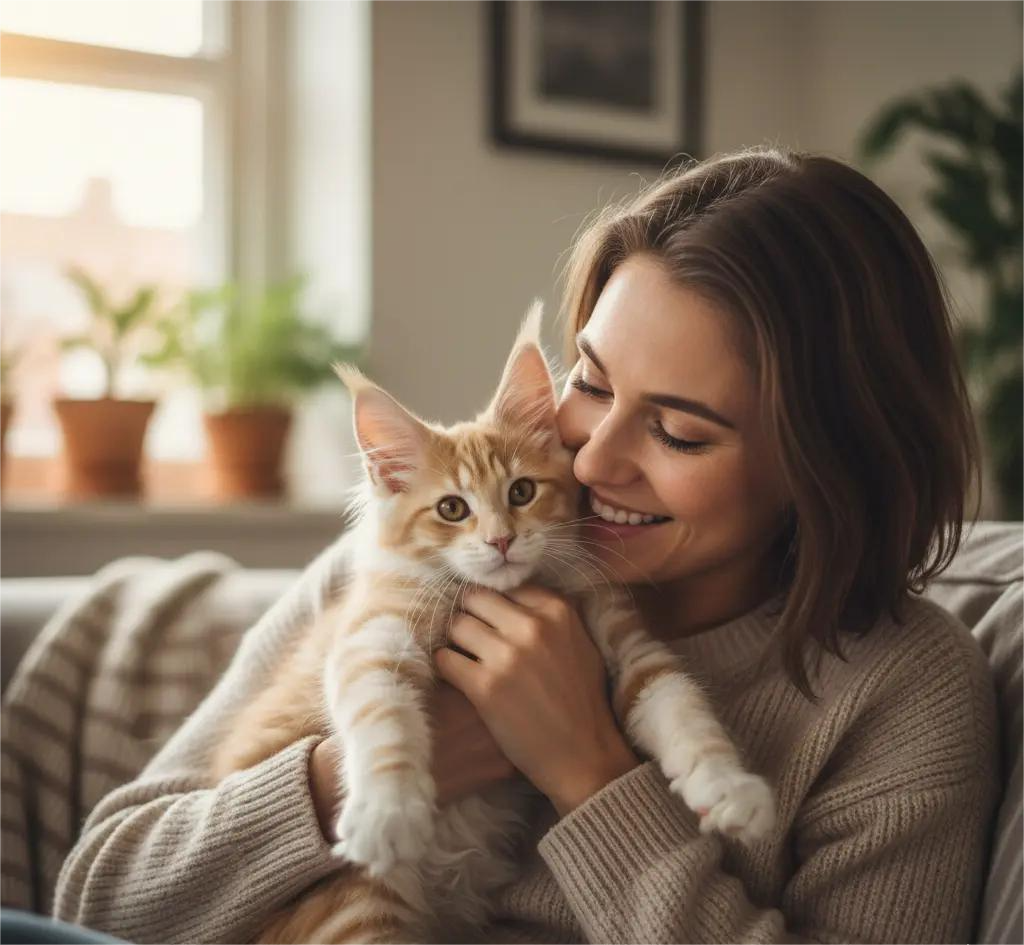
Hi, I’m Rob Archer. I’m deeply passionate about helping cats find loving homes and giving people the tools to make rescue and adoption easier. Every article I write is driven by a love for animals and a belief that every cat deserves responsible, long-term care. Learn more about Rob Archer.
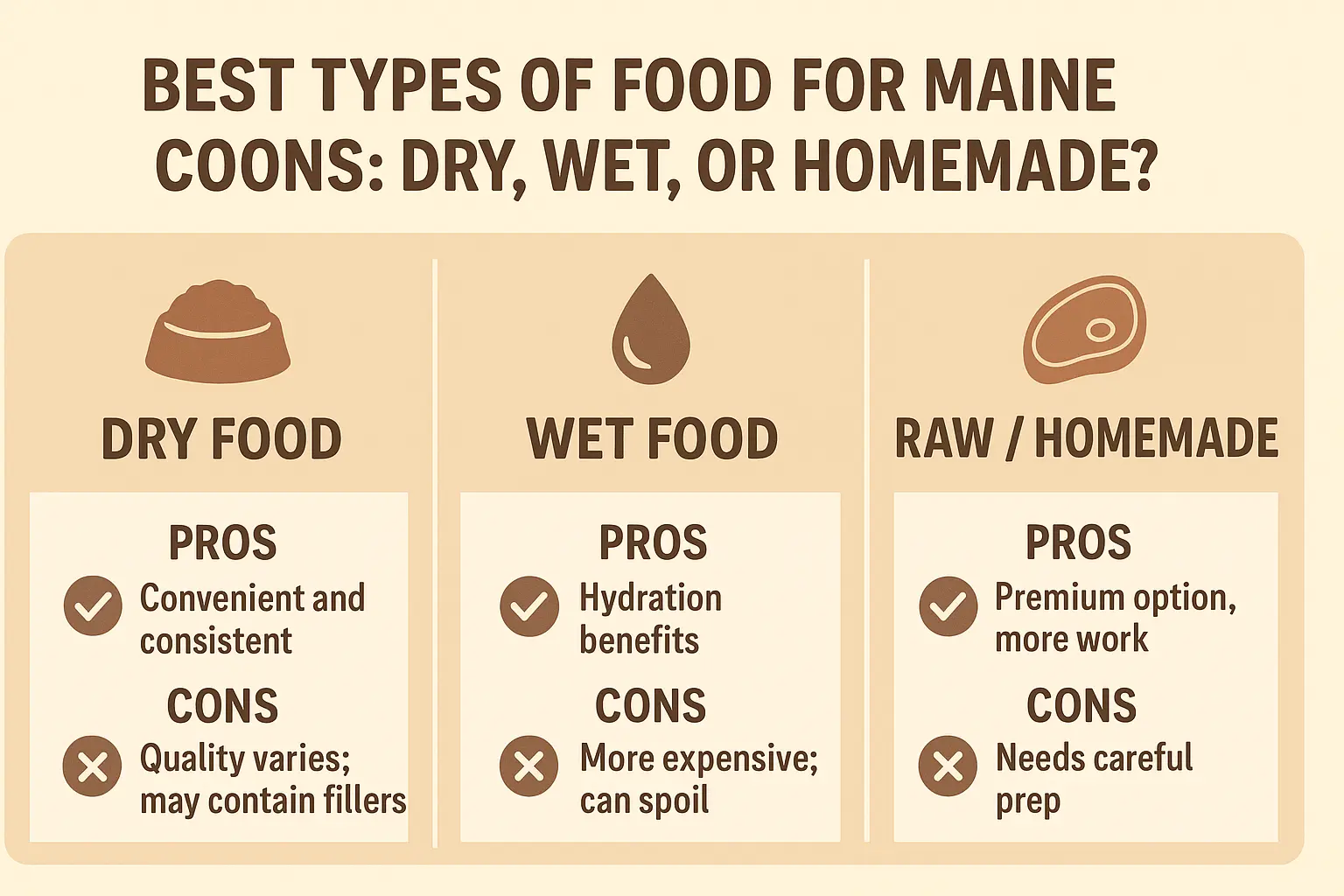
This feeding chart helped me so much! I’ve always been confused about portion sizes for Maine Coons, especially since they grow so differently from regular cats. Thank you for breaking it down.